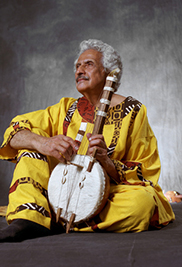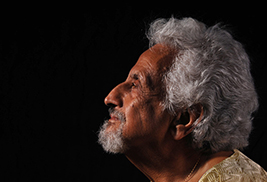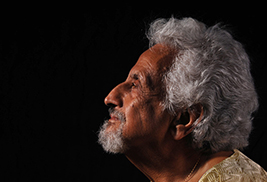Featured Article
Sound Art Project Contributes to the Distinguished Legacy of Kent State Professor Emeritus Halim El-Dabh
Kent State Professor Emeritus Halim El-Dabh, an internationally renowned composer, pioneered the fields of electronic music composition and worked alongside modern American composers such as Aaron Copland, Irving Fine and Leonard Bernstein.
read moreSound Art Project Contributes to the Distinguished Legacy of Kent State Professor Emeritus Halim El-Dabh
Posted Sept. 7, 2015 | Haley Keding
Kent State Professor Emeritus and
internationally renowned, Egyptian-born
composer Halim El-Dabh pioneered the
fields of electronic music composition.
Laurel Myers Hurst, previously adjunct faculty member at Kent State University at Geauga and Kent State School of Music alumna, has dedicated her career to expanding the legacy of Kent State Professor Emeritus and internationally renowned, Egyptian-born composer Halim El-Dabh through her study of El-Dabh’s sound art.
El-Dabh pioneered the fields of electronic music composition and worked alongside modern American composers such as Aaron Copland, Irving Fine and Leonard Bernstein. He also contributed to the musical world with his ethnomusicological research and is known as one of Egypt’s most significant living composers. By organizing and annotating his collected life’s work, Hurst hopes to provide insight and guidance for future analysis of 20th-century musical literature.
Denise A. Seachrist, Ph.D., interim dean at Kent State University at Stark and author of El-Dabh’s biography, The Musical World of Halim El-Dabh, is at the forefront of documenting his life.
“He is a recipient of numerous honors, awards and grants, including two Rockefeller fellowships, two Fulbright fellowships and two Guggenheim fellowships,” Seachrist says. “His music has been performed at the Metropolitan Opera House, the Cairo Opera House and the Edinburgh Festival. Some of his pieces, which were written for the Sound and Light of the Pyramids of Giza, are performed daily at the pyramids. El-Dabh has been blessed with a divine gift of exceptional musical creativity and expression, yet throughout his career he has often been discounted and misunderstood by those closest to him.”
In 2007, Wire Magazine boldly named El-Dabh the father of electroacoustic music. According to Wire Magazine’s article, El-Dabh created his first electroacoustic piece, “Ta'abir Al-Zaar,” years prior to Pierre Schaeffer’s “Musique Concrète.” This realization caused El-Dabh’s notoriety to grow exponentially and helped fuel Hurst’s own research on his life.
“Halim El-Dabh is now recognized as the inventor of electroacoustic music, and that’s a game changer for his legacy,” Hurst says. “I see this as an opportunity for his reputation to grow and for Kent State’s acclaim in music and composition studies to grow with it.”
El-Dabh taught in Kent State’s School of Music and Department of Pan-African Studies from 1969 to 2012. In 1989, he was appointed the special rank of University Professor, and in 2001, he received an honorary Ph.D. degree from the university. Hurst first met El-Dabh as a student in 1986, and in 2013, she began to work with the El-Dabh Archives, a collection of documents from El-Dabh’s musical career and personal life. As the project developed, she documented El-Dabh’s reactions and remembrances as he sorted through boxes of personal correspondence, scores, drafts and other materials.
“It was fascinating to be able to meet with someone, spend time with him and document his recollections of some of the greatest people from the 20th century,” Hurst says.

Halim El-Dabh taught in Kent State’s School of Music and
Department of Pan-African Studies from 1969 to 2012. In
1989, he was appointed the special rank of University
Professor, and in 2001, he received an honorary Ph.D.
degree from the university.
The completeness and quality of the El-Dabh collection has been recognized with a GRAMMY Foundation 2015 Preservation Assistance Grant award. Though frailty of health has prevented utilization of the award for the benefit of the archives, Hurst hopes the collection will remain intact and preserved for future generations.
In the meantime, the El-Dabh family is working to share even more of his music with the public.
“It’s typical for a composer's fame to grow as time goes by,” Hurst says. “Some of El-Dabh’s most cherished works that have never been entrusted to an outside publisher may become increasingly available through Mrs. El-Dabh’s publication company, Halim El-Dabh Music LLC. I’ve had the pleasure of bringing a few compositions to publication-ready status during the time I worked with Mrs. El-Dabh.”
The family plans to publish five folkloric piano pieces, which are intimate works reminiscent of El-Dabh’s mother and childhood. These compositions will be accessible to intermediate piano players, which Hurst believes will help grow Kent’s community of young pianists.
Hurst also anticipates reviving a voice and percussion piece about El-Dabh’s experiences in Ethiopia, “Born from the World,” at Howard University’s Sesquicentennial Anniversary in 2017.
“I would love to see a collaboration between Addis Ababa University in Ethiopia, where he worked as an associate professor of music, Kent State University, which is Dr. El-Dabh’s academic home, and Howard University, where he also was a full-time professor,” Hurst says.
Many of the musicians and scholars El-Dabh has met in his 94 years continue the effort of building El-Dabh’s legacy while being respectful of the needs of the family that come with advancing age.
“I remain a friend of the family, but my research is moving toward publically available works at this time because of the needs of the family,” Hurst says. “However, this project will just transform into something greater; everything does.”
To learn more about Hurst and her research, visit http://laurelmyershurst.com/.
To learn more about El-Dabh and his work, visit www.halimeldabh.com/welcome.html.
